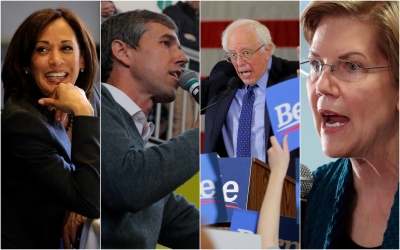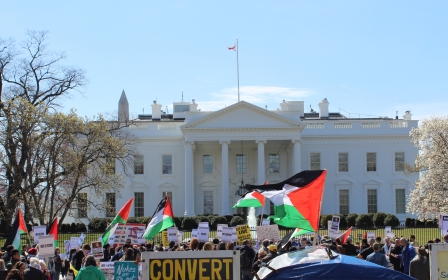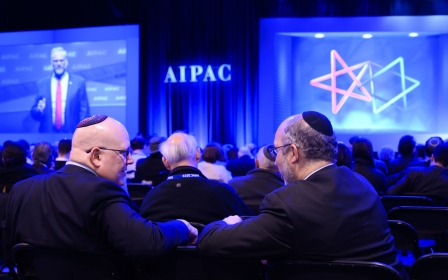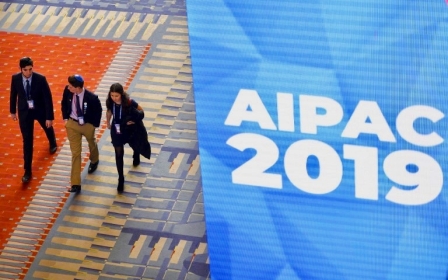Mike Pence calls out top 2020 Democrats for skipping AIPAC

US Vice President Mike Pence has slammed Democratic presidential candidates for skipping the AIPAC conference, accusing the party of no longer supporting Israel.
In a speech at the pro-Israel lobby group's annual conference in Washington on Monday, Pence said no candidate seeking the highest office in the United States should be afraid to pledge his or her support for AIPAC.
"As I stand before you, eight Democrat candidates for president are actually boycotting this very conference," Pence said.
"So let me be clear on this point: Anyone who aspires to the highest office in the land should not be afraid to stand with the strongest supporters of Israel in America."
What is the AIPAC conference?
+ Show - HideThe American Israel Public Affairs Committee (AIPAC) is a pro-Israel lobby group based in the United States.
AIPAC bills itself as "a bipartisan organisation of US citizens committed solely to strengthening, protecting and promoting the US-Israel relationship".
The group has hosted a national policy conference every year since 1960, attracting some of the most powerful people and groups across the US.
In 1995, Bill Clinton became the first sitting US president to address the AIPAC summit.
Former US presidents George W. Bush and Barack Obama also spoke at the event during their time in the White House, while major politicians from both the Democratic and Republican parties attend the event each year.
The influence AIPAC wields on US politics came under increased scrutiny when Obama was president, after Israeli Prime Minister Benjamin Netanyahu addressed the US Congress without an official invitation from the Obama administration.
Many Democratic lawmakers boycotted Netanyahu's speech at the time, signalling a rift between pro-Israel lobbyists and some Democratic lawmakers, who saw the Israeli premier's speech as a clear insult to the US's first black president.
In response to the clear animosity between Obama and Netanyahu, AIPAC sought to ensure that support for Israel remains bipartisan in Washington.
AIPAC officials, including the group's president, issued an apology in 2016 after then-presidential candidate Donald Trump attacked Obama as "maybe the worst thing to happen to Israel" during his speech at that year's AIPAC conference.
"While we may have policy differences, we deeply respect the office of president of the United States and our president, Barack Obama," AIPAC President Lillian Pinkus said after Trump's address.
In fact, last month AIPAC said it was "proud [to be] engaged in the democratic process to strengthen the US-Israel relationship".
"Our bipartisan efforts are reflective of American values and interests. We will not be deterred in any way by ill-informed and illegitimate attacks on this important work," the group said on Twitter.
However, this year's AIPAC conference comes amid renewed criticism of the group's influence.
Democratic Congresswoman Ilhan Omar last month said she wanted to discuss the pressure in Washington to pledge "allegiance to a foreign country", referring to the pro-Israel lobby.
Her comments drew accusations of anti-Semitism, but many Jewish- and Muslim-American activists quickly came to her defence, saying the attacks against Omar were part of a concerted effort to curb debate around the Israeli-Palestinian conflict.
While top Democratic presidential candidates are skipping this year's conference, members of the party's old guard, including House Majority Leader Steny Hoyer, attended the summit in Washington.
Hoyer even slammed Omar, his Democratic Party colleague, in a speech at the conference on 24 March, pledging to maintain unequivocal US support for Israel.
US Vice President Mike Pence and Benny Gantz, an ex-Israeli army chief and the top challenger running against Netanyahu in next month's elections in Israel, also spoke at the conference on 25 March.
Pence appeared to echo the rhetoric of his boss, President Donald Trump, who recently accused Democrats of abandoning Israel and as a result, called on Jewish-Americans to support Republicans instead.
New MEE newsletter: Jerusalem Dispatch
Sign up to get the latest insights and analysis on Israel-Palestine, alongside Turkey Unpacked and other MEE newsletters
Several top Republicans have also recently accused Democrats of showing dwindling support for Israel - a strategy that analysts say aims to exploit divisions within the party ahead of the 2020 presidential elections.
In fact, Democrats already seem to be turning on one another over Israel, as House Majority Leader Steny Hoyer condemned fellow Democratic lawmakers critical of Israel during a speech at the AIPAC conference on Sunday.
Combating BDS
A day later, Pence also called out the top 2020 Democratic presidential candidates for opposing a recent bill that encourages states to penalise contractors who boycott Israel.
The bill, which passed in the US Senate last month with the support of the majority of Democratic lawmakers, is the latest US legislative measure to target the Boycott, Divestment and Sanctions (BDS) movement.
BDS seeks to pressure Israel economically and politically to end its human rights abuses against Palestinians.
"Remarkably, today, all but one Democrat running for president voted against the Combating BDS Act in the United States Senate," Pence told AIPAC delegates.
Senator Amy Klobuchar was the only Democratic lawmaker in the presidential race to back the bill, while leading candidates Bernie Sanders and Kamala Harris voted against it.
Leading US rights advocates have called anti-BDS laws a threat to the First Amendment, which protects freedom of speech.
In fact, federal courts overturned anti-BDS laws in the states of Arizona and Kansas last year, while several other measures are still being challenged in the legal system.
"It's astonishing to think that the party of Harry Truman, who did so much to help create the state of Israel has [been] co-opted by people who promote ranked anti-Semitic rhetoric and work to undermine the broad American consensus for support for Israel," Pence said on Monday.
Former President Truman, a Democrat, was amongst the first world leaders to recognise Israel as a state in 1948.
Denouncing Ilhan Omar
On Monday, Pence went on to denounce Muslim-American Congresswoman Ilhan Omar, without identifying her by name - a common occurrence among this year's AIPAC conference speakers.
In his speech, Pence accused Omar of trafficking in "anti-Semitc tropes".
The lawmaker faced widespread attacks last month after she said the pro-Israel lobby pushes for "allegiance" to a foreign nation and suggesting that support for Israel in Washington is driven by financial contributions to US politicians.
Left-wing members of Congress and several Democratic presidential candidates defended the congresswoman, however, noting that the backlash against her had led to threats to her safety.
Still, the controversy has led to growing calls to remove Omar from the House Foreign Affairs Committee, a demand Pence reiterated in his speech on Monday.
"At a minimum, anyone who slanders those who support this historic alliance between the United States and Israel should never have a seat on the Foreign Affairs Committee of the United States House of Representatives," he said.
Later on Monday, US Secretary of State Mike Pompeo addressed the AIPAC conference saying that anti-Zionism is the same as anti-Semitism, a notion often disputed by Palestinian rights activists, who say that accusations of anti-Semitism aim to silence the debate on Palestine.
"So, friends, let me go on record: Anti-Zionism is anti-Semitism," Pompeo said. "The Trump administration opposes it unequivocally and we will fight for it relentlessly. "
Middle East Eye delivers independent and unrivalled coverage and analysis of the Middle East, North Africa and beyond. To learn more about republishing this content and the associated fees, please fill out this form. More about MEE can be found here.





